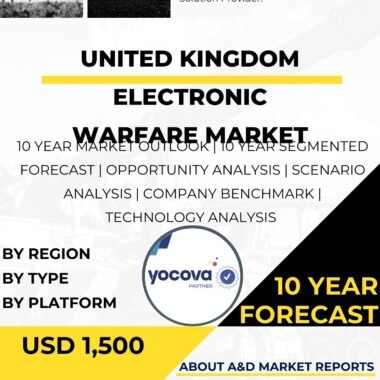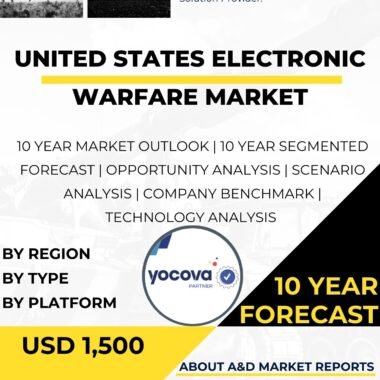Description
The Germany Electronic Warfare (EW) Market is a crucial and rapidly evolving sector within the country’s defense industry. Electronic warfare encompasses a broad range of capabilities and technologies that leverage the electromagnetic spectrum to disrupt, deceive, or defend against enemy communication, radar, and sensor systems. In modern warfare, where information dominance is essential, electronic warfare plays a pivotal role in gaining a strategic advantage and protecting friendly forces from hostile threats.
The adoption of electronic warfare in Germany’s defense sector is driven by several key factors. One of the primary drivers is the increasing complexity and sophistication of modern military operations. As adversaries develop advanced communication and sensor systems, Germany recognizes the critical need to counter and neutralize these threats effectively. Electronic warfare systems offer the capability to deny, deceive, or degrade enemy sensors, communications, and navigation, enhancing Germany’s military capabilities and ensuring mission success.
The Germany Electronic Warfare Market is fueled by the country’s commitment to technological innovation and maintaining a competitive edge in the global defense arena. Germany understands the strategic significance of electronic warfare in modern warfare scenarios and is dedicated to equipping its armed forces with cutting-edge EW solutions.
The Germany Electronic Warfare Market also benefits from a robust domestic defense industry with expertise in electronic systems, signal processing, and sensor technologies. German defense companies are actively engaged in research and development to pioneer electronic warfare systems, contributing to the country’s self-sufficiency in meeting its EW requirements.
A core objective of the Germany Electronic Warfare Market is to provide the German Armed Forces with state-of-the-art EW systems that offer advanced electronic attack, electronic support, and electronic protection capabilities. These systems are designed to operate across multiple domains, including land, air, and sea, and can be integrated into various platforms, such as aircraft, ground vehicles, and ships.
The adoption of electronic warfare offers several advantages for the German defense forces. First and foremost, EW systems provide the ability to disrupt and degrade enemy communication networks, thereby limiting their operational effectiveness and coordination. By jamming or interfering with enemy radio frequencies and radars, electronic warfare can hinder their ability to gather intelligence and communicate on the battlefield.
Furthermore, the Germany Electronic Warfare Market contributes to force protection and situational awareness. Electronic support measures, such as radar warning receivers and electronic intelligence systems, provide real-time information about potential threats, enabling friendly forces to take proactive measures and avoid detection or attacks.
Moreover, defense EW systems play a critical role in electronic attack missions. By using electronic jamming and deception techniques, electronic warfare systems can disrupt enemy sensors and communication systems, reducing the risk of incoming threats and increasing the survivability of friendly forces.
Additionally, the Germany Electronic Warfare Market supports military operations in challenging and contested environments. As modern warfare increasingly involves non-kinetic threats, such as cyberattacks and electronic warfare, Germany’s investment in EW capabilities becomes paramount for ensuring operational success and mission accomplishment.
However, the Germany Electronic Warfare Market also faces challenges that need to be addressed for successful implementation. One significant hurdle is the rapidly evolving and dynamic nature of electronic warfare. Adversaries are constantly developing new electronic countermeasures and adaptive tactics, requiring Germany to maintain continuous innovation and development to stay ahead in the EW domain.
Moreover, the Germany Electronic Warfare Market must address challenges related to spectrum management and frequency allocation. As the electromagnetic spectrum becomes increasingly crowded with communication and sensor systems, efficient spectrum usage and frequency agility are essential for electronic warfare operations.
Looking ahead, the Germany Electronic Warfare Market is expected to witness continued growth and technological advancements. As the country’s defense forces increasingly rely on networked and information-centric operations, the demand for advanced electronic warfare capabilities will rise.
The German government’s commitment to investing in electronic warfare technology and fostering collaboration with defense industry partners will be instrumental in driving the adoption and deployment of state-of-the-art EW systems.
In conclusion, the Germany Electronic Warfare Market is a critical and transformative segment with significant implications for the country’s defense capabilities and military readiness. With a focus on innovation, research, and collaboration, the German defense industry is poised to remain at the forefront of electronic warfare system development. Additionally, by adopting advanced EW systems, Germany can enhance its defense capabilities, improve situational awareness, and continue to foster technological innovation in the field of electronic warfare. As electronic warfare technology continues to evolve, the Germany Electronic Warfare Market will play a pivotal role in ensuring the success and effectiveness of the German Armed Forces in an ever-changing and contested security landscape.




